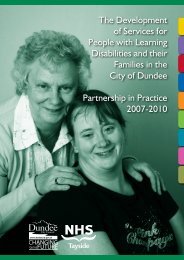Information for Parents and Carers of Children with - Dundee City ...
Information for Parents and Carers of Children with - Dundee City ...
Information for Parents and Carers of Children with - Dundee City ...
Create successful ePaper yourself
Turn your PDF publications into a flip-book with our unique Google optimized e-Paper software.
Experience financial difficulties (housing modifications, need <strong>for</strong> a special car,<br />
medication, respite costs, travel costs, equipment, specialist toys) all <strong>of</strong> which can cause<br />
strain on the family.<br />
Find returning to work is difficult due to treatment <strong>and</strong> additional needs <strong>of</strong> the child.<br />
At certain stages, the stresses can appear particularly high. However, parents won’t feel all<br />
these stresses at the same time. In fact, just like in any other family, feelings <strong>of</strong> happiness,<br />
achievement <strong>and</strong> satisfaction can be, <strong>and</strong> are, enjoyed. The main message is <strong>for</strong> you to be<br />
aware <strong>of</strong> what life may be like <strong>for</strong> the family. Most burdens can be lightened by the caring<br />
support <strong>and</strong> open communication that you can provide as a relative or close friend.<br />
With parents, denial is part <strong>of</strong> the normal reaction to the news that a child has additional<br />
needs. Denial helps avoid the pain <strong>and</strong> grief associated <strong>with</strong> the diagnosis. However, <strong>with</strong><br />
time <strong>and</strong> support a degree <strong>of</strong> acceptance can be achieved.<br />
Even though you may not be the parent <strong>of</strong> the child, it is normal <strong>for</strong> you also to have<br />
difficulties <strong>with</strong> denial or grief over the child’s condition. You may think about seeking<br />
support <strong>for</strong> you own needs <strong>and</strong> feelings in order to better support the parents <strong>and</strong> the child.<br />
The opportunity to exchange in<strong>for</strong>mation <strong>and</strong> to discuss feelings <strong>with</strong> relatives <strong>of</strong> other<br />
families will provide you <strong>with</strong> mutual support in the acceptance <strong>of</strong> the diagnosis <strong>of</strong> the child’s<br />
additional needs.<br />
Therapy <strong>and</strong> Medical Appointments<br />
<strong>Parents</strong> <strong>of</strong> children <strong>with</strong> additional needs see many medical practitioners, therapists <strong>and</strong><br />
other pr<strong>of</strong>essional <strong>and</strong> care staff. These people have the best interests <strong>of</strong> the child at heart<br />
when suggesting therapy <strong>and</strong> courses <strong>of</strong> action to follow. As parents <strong>of</strong>ten face many<br />
“unknowns” <strong>with</strong> their child’s condition, the pr<strong>of</strong>essional expertise <strong>and</strong> advice they receive is<br />
very important to them. As a family member or friend it is important that you support the<br />
advice <strong>and</strong> ef<strong>for</strong>ts <strong>of</strong> the pr<strong>of</strong>essionals that the parents trust <strong>and</strong> respect, even though you<br />
may not agree <strong>with</strong> what they are doing.<br />
Your acceptance <strong>and</strong> support is both necessary <strong>and</strong> valuable to families <strong>with</strong> additional<br />
needs.<br />
Empathy<br />
<strong>Parents</strong> do not want sympathy! What they want is empathy, which is an ef<strong>for</strong>t by you to<br />
underst<strong>and</strong> how they are feeling <strong>and</strong> what they are going through. To gain empathy, you<br />
could try imagining yourself in the parent’s situation <strong>for</strong> a while. Below is an outline <strong>of</strong> the<br />
additional stresses identified by parents caring <strong>for</strong> a child <strong>with</strong> additional needs. The<br />
following pressures are above <strong>and</strong> beyond the daily hassles <strong>and</strong> stressful life events that all<br />
families experience. Reading them may help you to underst<strong>and</strong> the family’s situation better.<br />
• Frustration <strong>with</strong> not knowing what will happen <strong>with</strong> the child long term <strong>and</strong> the difficult <strong>of</strong><br />
finding clear answers.<br />
• Feelings <strong>of</strong> guilt if not continually attending to the extra needs <strong>of</strong> the child as well as<br />
those <strong>of</strong> other members in the family.<br />
• Questioning why the child has the condition, <strong>and</strong> if it could have been prevented.<br />
• Dealing <strong>with</strong> the chronic grief <strong>and</strong> loss <strong>for</strong> the “normal” child the parent does not have.<br />
• Concern about acceptance <strong>of</strong> the child into the community (school, shopping centres,<br />
playground, church).<br />
<strong>In<strong>for</strong>mation</strong> Pack – <strong>Children</strong>’s Services 8













